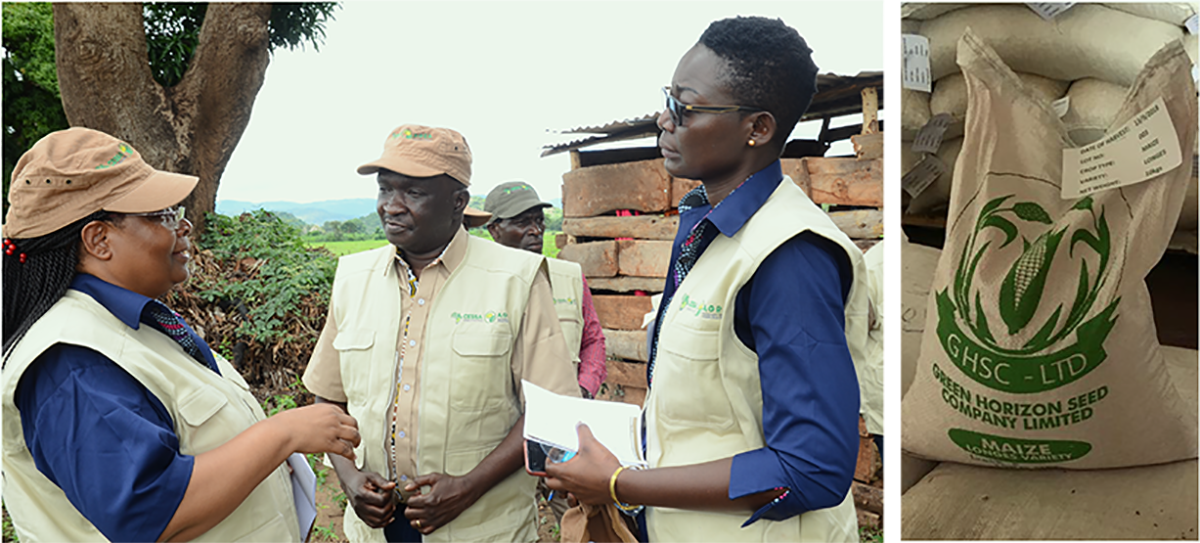

Learn more about CESSA
Vision:
Africa’s farmers equally and reliably access a
wide choice of quality and affordable seed

Mission:
To lead in the linkage to and delivery of practical
and high-quality knowledge, information, tools, and
models for functional seed system development.
CESSA, hosted by AGRA was born out of the need for a one-stop center to accelerate the availability of quality seeds that meet the market and ecological demands of African farmers for increased profitability, resilience, and production.
CESSA, launched in September 2021, will serve to support governments, the private sector, and development partners to deliver modern, effective, and resilient seed systems to serve African farmers better. It will strengthen the seed value chain, particularly variety development and release, production and distribution of both early generation and certified seed, farmer awareness creation and participation, quality assurance, national planning, and inform policy and regulatory frameworks.
CESSA will support informed, evidence-based decision-making, investments, and the provision of technical advice and support for the implementation of improved seed systems. It will conduct national seed system analyses, provide advisory services and external technical assistance, as well as training and capacity building for the seed sector.
Development of National Seed Investment
Plans and Ownership:
Investments in national seed systems have always been made in an ad hoc manner with no clear analysis of the entire seed system and prioritization of the critical gaps. With the application of the Seed System Analysis Tool (SeedSAT) this is now possible because all components of the seed systems are analyzed, prioritized and recommendations made. This is followed by the validation exercise of the results, prioritized areas and recommendations by national seed stakeholders who include public institutions, private sector, development partners, NGOs and agricultural affiliated international institutions. The final products in this case are nationally owned seed investment plans given the inclusivity nature of the process. AGRA’s role is to help with the analyses and coordination of the process and partners.
CESSA programs will be implemented
under 3 flagship pillars
1. Analytics and Knowledge management
This flagship program hosts the comprehensive SeedSAT, which links assessment results and proposed solutions to other CESSA areas. This pillar builds and maintains a large base of searchable evidence and resources related to seed systems, beginning with the extensive evidence collected for seed systems. To include curated case studies, models, tools and datasets on viable seed system models.
1. Analytics and Knowledge Management
Examples of evidence collected:
- SeedSAT assessments, to populate a knowledge library
- Regulations and amendments
- Laboratory site visit reports and photos
- Seed labels
- Seed producer and distributor lists
- Variety release lists
- Seed distribution channel information
Examples of potential case studies to be shared for sector strengthening:
- E-certification approaches, results and lessons
- Scratch-off label approaches, results and lessons
- New variety promotion campaigns, results and lessons
- VBA approaches, results and lessons
- Seed trade bottlenecks and solutions
2. Capacity Building and Technical Support
The focus is mainly on delivering AGRA advisory services and designing and overseeing catalytic grants, focused on prioritized solutions based on SeedSAT assessment findings.
This flagship area is highly collaborative and strategically driven to work with national governments, noting that initiatives by different public and private actors remain uncoordinated, leading to neglect of certain key elements.
It builds upon AGRA’s track record to date, with a focus on scalable interventions such as better production models and best practices for quality assurance, based on verifiable data and information for decision-making, as often there is lack of solid evidence about what is working and what is not. This pillar offers technical advice and support for improving system processes; bridge identified gaps, through strategic partnerships to address these challenges and take advantage of opportunities to influence, leverage and invest.

3. Catalytic Grants and AGRA Advisory
Highly expert-driven support for the technical aspects of seed systems, often in collaboration with partners. Focus areas will be highly driven by results of SeedSAT assessments, with additional emphasis on work that can be scaled. Technical support can take the form of exchange visits, expert visits or placements, scoping visits and studies, ongoing coaching. Capacity building will focus on new, scalable approaches with catalytic use of digital learning management systems.
Examples of high potential, technical capacity building approaches
- Hybrid digital and field training, e.g, for laboratory and field-based seed quality assurance
- Digital and field-based training for authorized inspectors, such as SCCI (Zambia) is currently developing.
- Digital continuing education courses for licensed inspectorsDigital continuing education courses for licensed inspectors
- Digital training and ongoing virtual support for EGS production for new EGS producers
Examples of effective, scalable technical support
- Peer-to-peer learning groups for field-based permanent actors
- Dissemination for guided use of knowledge resource tools
Envisioned benefits of CESSA
- Serve as the “go to” center to analyze and propose collaborative solutions for seed system challenges.
- Serve as a critical “go to” center for information, evidence, advice, models, technical services and support.
- Support technology (climate smart and nutrient dense crop varieties) deployment through various channels and NARES support
- Support governments with technical expertise to develop sustainable, vibrant seed systems serving farmers.
- Strengthen seed systems to complement, leverage and improve the impact of other related initiatives.

Technical Collaborators










Development Partners







